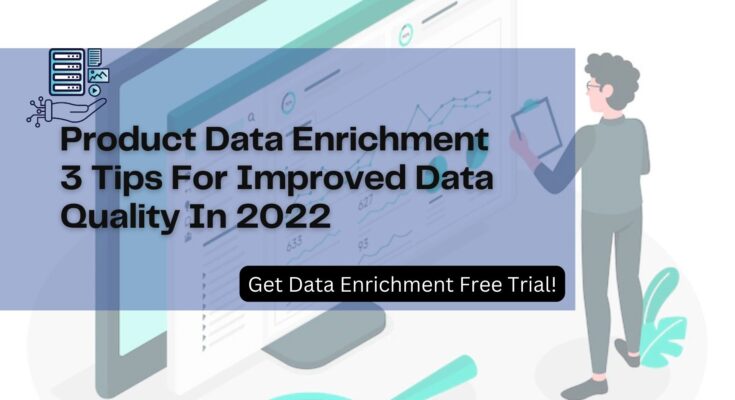In today’s tech-driven world, high-quality and relevant data is the potential driving force behind enhanced customers’ experiences. Though new technological advancements led to a significant increase in productivity of businesses, it has created a dependency on data. Therefore, if the data is faulty or unreliable, it can prove disastrous for the respected organization.
As per the Harvard Business Review, 47% of data has an integrity problem, which results in an average $15 million financial impact on businesses. For these reasons, partnering with a data enrichment company has risen to the top of the to-do list of myriad businesses.
Data enrichment protects companies against the loss of data caused by redundant or outdated entities. They can gain valuable insight and enhance the value of their data at the same time. With the help of clever automation techniques, the data enrichment process shortens the effort and time required to execute the operation. This post will outline 3 important tips for improving data quality. But before we jump straight to this main thread, let’s have a brief overview of what data enrichment is exactly.
Data Enrichment: Defining The Term
Data enrichment is the process of combining internal data assets with external data for making customers’ data assets more valuable. It enhances the quality of the existing data of your business and adds new pertinent or missing information to increase the usability of the data.
Enrichment can make sure that the fields gathered for already-existing data are accurate, have proper syntax, and are ready for usage. Additionally, the pertinent information that enrichment adds may allow for more uses and applications of the data.
Benefits Of Data Enrichment
An organization can get various advantages from outsourcing data enrichment, including improving customer experience, increasing prospect conversion rates, and managing risk and compliance. Let’s learn about this in brief descriptions.
1. 360-Degree Customer’s View
Marketers can obtain a 360-degree view of their clients by enhancing customer profiles with reliable external third-party data and enhancing their contact data records. By adding geo coordinates to address locations, for instance, marketers may pinpoint exactly where their target audience is. This enables marketers to visualize consumer locations differently and identify the locations of clusters of their most devoted clients.
2. Increased Sales
Marketers can also prioritize their leads more effectively by using lead scoring with a 360-degree picture of their clients. Combining data from the leads themselves with first-party data and data from reliable external sources gives lead scoring engines the most complete picture possible, which improves performance. This results in improved sales productivity.
3. Helps In Complying With Regulations
To comply with laws like the California Consumer Privacy Act (CCPA) and the General Data Protection Regulation (GDPR), data enrichment is extremely essential. You can detect PII data and respond to requests from data subjects to share and update their personal information by using a data quality process that purifies, standardizes, deduplicates, and enriches data.
4. Customer Experience
Learn more about your consumers’ preferences, brand affinities, purchasing patterns, visit patterns, and areas of interest by using data enrichment services. As a result, customers will have a more gratifying experience.
3 Tips For Improved Data Quality In 2022
Listed below are the tips to improve data quality in 2022 that will eventually businesses in the long run.
1. Gather and prepare your most recent product information.
All of your product information should be noted and prepared for use across a wide variety of platforms and channels. The impact of inaccurate data on retail organizations is significant; incorrect product data is the primary cause of rising product returns and declining brand loyalty. Data that is inconsistent, duplicated, erroneous, and incomplete is a major problem in the retail industry.
Therefore, it is advisable to regularly review your product content page to see what is missing from it. Make sure your product data has all the necessary information and is correct and complete. For example, data enrichment services will probably return a null response or add incorrect information if a crucial record attribute, such as “name,” is spelled incorrectly.
Additionally, data needs to be supplemented with new information to give customers a better shopping experience. As the data is gathered from a variety of sources, including ERP, suppliers, and marketing channels, it must be integrated well with your system. Managing product data comes with its own set of challenges and demands careful consideration. Therefore, outsourcing data enrichment services ensures easy improvement and management of data repositories.
2. Wipe out data duplicities and redundancies.
One of the most important steps in the process of data enrichment is extrapolating the data. Engineers can use logical approaches to extract more information from a data source. After data purification, it’s crucial to match data with duplicates of already-existing data.
One of the hardest types of duplication to find is probabilistic duplication. Fields of information known as probabilistic duplicates may represent the same thing yet differ in terms of details like spelling, contact information, and even email addresses. To check whether the records are a reflection of the same entity, regular record-to-record matching is necessary. It’s critical to maintain a high level of accuracy in data matching.
Additionally, data deduplication needs to be finished concurrently. This is crucial because it’s possible that if an entity’s information is modified, a new record could accidentally be produced in its place rather than being updated. Only when duplicates are removed and the records are cleaned, can data enrichment be effective.
3. Organize your products and their attributes accurately.
A Forrester survey claims that badly organized retail websites sell 50% fewer products than well-designed websites.
When you have thousands of products on your page, it becomes crucial to arrange the products properly for better organization. Each product must be labelled and categorized precisely so that it can be found with the fewest number of clicks and seconds.
Organize products so that buyers may filter, refine, and sort product information for a seamless shopping experience and methodical navigation. The process can be made simpler by creating families and attribute groups, and by adding as many characteristics as you can, such as colour, size, price, etc.
You can add more attributes, like searching for specific brands for clothing or diet food options. Given the enormous variety of items available, categorizing them would require subject-matter expertise. Therefore, it is advisable to outsource data enrichment to save yourself from the labour-intensive and time-consuming data enrichment process.
The Bottom Lines
It’s time to start thinking about how you might boost your revenue in 2022 as the year goes on. Focusing on the product page is crucial if you want your business to expand. With the swipe of a finger, today’s consumers search for things and anticipate finding them quickly. Any delay means your customer will switch to the competing platform.
Filters and categorization make the product easier to find. When the product is found, it has to have current, accurate, and consistent information. One of the numerous tactics that could boost sales and revenue for any company wanting to advance its digital marketing approach is the use of data enrichment strategies. Considering the large volumes of data put in by retailers, manual efforts are not satisfactory for reaching the high levels of data enrichment. The right approach would be to outsource data enrichment requirements to experts for enhanced outputs.
Author Bio

Gracie Ben is a data analyst currently working at DataEntryIndia.in, a leading company providing data entry services & other data-related solutions. For more than ten years, she has actively contributed to the growth of many enterprises & businesses (startups, SMEs, and big companies) by guiding them to utilize their data assets.
Having a keen interest in data science, Gracie keeps herself up-to-date on all the latest data trends and technologies shaping the industry and transforming businesses. She has written over 1600 articles and informative blogs so far covering various topics, including data entry, data management, data mining, web research, and more.




